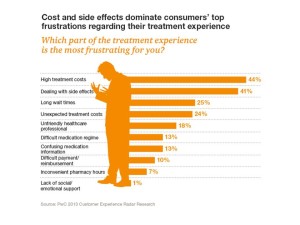 4 in 5 U.S. patients – 81% of them – want an equal say in health care decisions with their care provider, according to a 2013 Institute of Medicine study.
4 in 5 U.S. patients – 81% of them – want an equal say in health care decisions with their care provider, according to a 2013 Institute of Medicine study.
At the same time, patients choose to take “drug holidays,” opting out of taking three or more doses of medicines in a row, or adopt “trail mix” approaches to taking prescriptions, casually and inappropriately mixing Rx drugs.
Welcome to your world, pharma industry: where people say they want control, but somehow don’t exercise it in the way you — drug companies — define as “compliance” or “adherence.”
Customer experience in the pharmaceutical sector: Getting closer to the patient, a report from the Health Research Institute of PwC, talks about consumers’ expectations of industries they experience every day, setting the experience bar for life science companies, as well.
This next-generation patient, PwC says, is:
– Hungry for personalized information and real-time feedback
– An active participate in care and treatment
– Focused on convenience and on-demand services for busy lives, and
– Value-hunting through comparison shopping.
But this person – this consumer, patient, caregiver – is also reacting to high treatment costs and therapeutic side effects which complicate pharma’s ability to “get closer to the patient,” as the title of the report implores.
PwC identifies 4 consumer segments, including a self-reliant and fairly healthy person who wants to handle health care and get on with life; a motivate person who is managing several chronic conditions and values face-to-face contract with the health system; an invincible who tends to self-manage; and a chronically ill person who relies on others for help and support – preferring family to experts.
Health Populi’s Hot Points: The secret to success in this sauce isn’t going to be your father’s recipe for direct-to-consumer advertising.
There’s an intriguing turn-of-phrase on the report that makes me smile: “Consumers want their medication experience to be personalized and meaningful.” Really? Do people really look for meaning out of filling and taking an Rx? How about make the Rx low-cost, easy to tolerate with few to no side effects, and very effective.
If the Rx enhances my sex life or sleep, even better. I say this having recently analyzed results to the Health in America 2013 survey at HealthcareDIY.
Keep in mind: “insurance coverage” that trumps “physician recommendation” as the most important purchasing factors. At much lower consumer valuation are additional online medication information, patient testimonials, mobile apps, and health coaching. Shopping for value, an ethos spreading in the post-recession economy, is now part of medicines-at-retail, with people seeking good deals on medicines — across income cohorts. Witness the advent of Consumer Reports Best Buy Drugs, for example, and “free” statins at the grocery store.
Pharma companies must realize they are part of a larger health ecosystem for patients, consumers and caregivers. While they comprise about 10% of the total health care bill, the fact that they are purchased in retail settings and have a co-pay, coinsurance, or deductible associated with them makes the industry easy to criticize. One way to constructively engage with people is through trusted parties and channels where that “enchantment” and meaning can be experienced. Dr. Josh Riff, medical director at Target, is quoted as saying that people “want the right partners helping them make their health decisions. DIY doesn’t mean consumers don’t need you anymore.”
Pharma, your drug won’t be loved for itself alone (again, with sleep, sex and mental health enhancement possibly being more lovable outcomes). Your value, pharma, will be through enhancing peoples’ lives with respect to living. Best advice from PwC comes in the last paragraph of the paper: “Embrace DIY consumers determined to control their conditions.”




 Thank you FeedSpot for
Thank you FeedSpot for